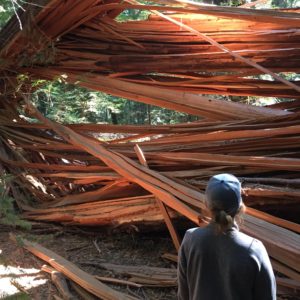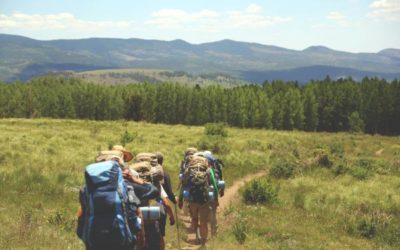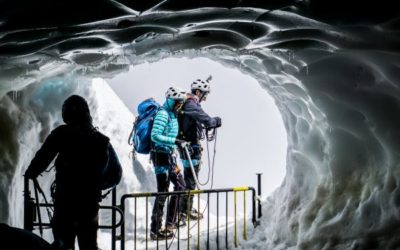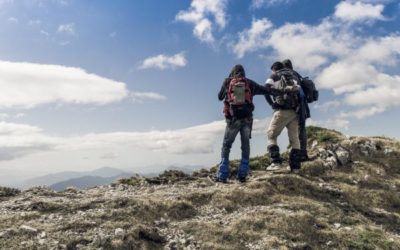Please enjoy this post from Andrew Underwood, from WMI as he continues to share insights in this Biblical Reflections on the Wilderness Essentials series.
Luckily There Was A Repair Kit
I took a group of high school boys on a backpacking trip up in the Trinity Alps of Northern California a few years ago. We were a few days into the trip, setting up camp next to this beautiful high mountain lake, all the tent groups we spread out and helping each other. One of the students was helping me set up my personal tent, and as he bent the pole into its spot on the footprint, the pole cracked and broke. Unfortunately, he had not seeded the pole sections together properly and it just levered that section too much. This young guy felt terrible and instantly started to frantically apologize as he was nervous that I would be really mad, and without a properly working tent for the remainder of the trip; He was so surprised to see me smiling and reassuring him.“What a great opportunity for you to learn how to fix a tent pole out here” I said to him, as I pulled out my repair kit. As always we were ready to handle situations just like this.
Things Will Break, Are You Prepared?
In our last installment of the 10 Wilderness Essentials Series, we talked about the importance and value of First Aid. Just like we need to be prepared for injuries and issues with our bodies, we need to be ready to do first aid on our gear. Whether it’s a broken tent pole, a leaking sleeping pad, or a faulty cooking stove, it is inevitable that something will break, tear or malfunction while you are in the backcountry. We rely so heavily on this gear for our wellbeing that we need it to be in good working order, so here are a few things for you to think through in regards to repairing gear in the backcountry.
1. Make sure your gear is working, cleaned, and maintained at home before you leave. Making sure everything is stored properly and maintained at home is a critical step in the right direction to having it work for you when you need it most.
2. Learn how to make basic repairs to tents, stoves, and clothing during the off-season so that you can utilize those skills when they are needed. Most items like stoves have repair, cleaning, and maintenance instructions, even kits. Be sure to read those and know how to perform those tasks.
3. Do a pre-trip inspection of all gear. Take out your tents, crank up your stoves, look over your sleeping bags before you head out. It is easier to make repairs before the trip than during.
4. Build a small kit with things like pole splints, patches, sealant, thread and needle, and extra batteries. Don’t forget some good tape!
5. A compact knife with pliers and other small tools is really useful for a variety of things.

Photo by Andrew Underwood
Our Repair Kits Remind Us of God’s Character
“While Jesus was in one of the towns, a man came along who was covered in leprosy. When he saw Jesus, he fell with his face on the ground and begged him, “Lord, if you are willing, you can make me clean.” Jesus reached out his hand and touched the man. “I am willing,” he said. “Be clean!” And immediately the leprosy left him.” – Luke 5:12-13
Just like we have been in the habit of doing, over the past few months, I want to take a moment to let the experience of gear repair in the backcountry guide us to the truths of scripture. So that, when (and we will) we find ourselves sewing up a hole in a tent or cleaning a sputtering stove that we can utilize that moment to speak transformative truth to those around us.
Take notice of this story in Luke. A man, stricken with a skin disease, on the outskirts of society and untouchable, approaches Jesus. Pay careful attention to what he asks Jesus; “if you are willing, you can make me clean.” Did you catch that? Not, “are you able?” But, “are you willing?” This man was unsure of the character Jesus, not His power. All three Gospels that record this story include a fine detail in Jesus’ response, that He ’“reached out his hand” to touch this untouchable man. See, in Levitical law, skin diseases made you unclean for the temple, and to touch someone like him would make you unclean as well. So sadly, these people, found themselves totally ostracized by society and unable to fully live out the Torah. I find it very interesting how Luke places this story just after Jesus called His first disciples. Because both of these stories show Jesus drawing nearer to broken, hurting, and sinful people and then setting them apart for His purposes. Is it not profound to see just how unthreatened Jesus was by the sin and brokenness of the world? He is the embodiment of the coal in Isaiah, coming to the lips of the unclean and transferring His holiness and righteousness instead of being defiled himself. We must see Jesus as ready, able, and willing to enter our brokenness with His cleansing power to overcome it.
God Uses the Tools of His Word and Spirit to Fix Our Brokenness
How powerful is it to know that God is unthreatened by the darkness of this world and is ready for our brokenness? When we malfunction in sin, He is fully prepared to deal with it. As a matter of fact, He has already dealt with it on the cross. So we can approach Him with full confidence, seeing that He’s near to the broken and trust that He is willing and able to mend, correct, and renew our faulty hearts.
Too often, like the young man who broke the tent pole, we let our mistakes induce fear and trembling, ready for chastisement when we approach God with our mistakes. We completely misjudge His character that He is prepared for our brokenness and ready to receive us to himself with open arms, and through the tools of His spirit and word will bring correction to our path.
Reflection:
1. Can you recall a time where something you needed in the backcountry broke? What did you do about it?
2. If a stove broke on a trip, how are you prepared to deal with it?
3. Can you think of two other ways to utilize the repair kits, tools, and knives that you bring on a trip to teach from the scriptures?




